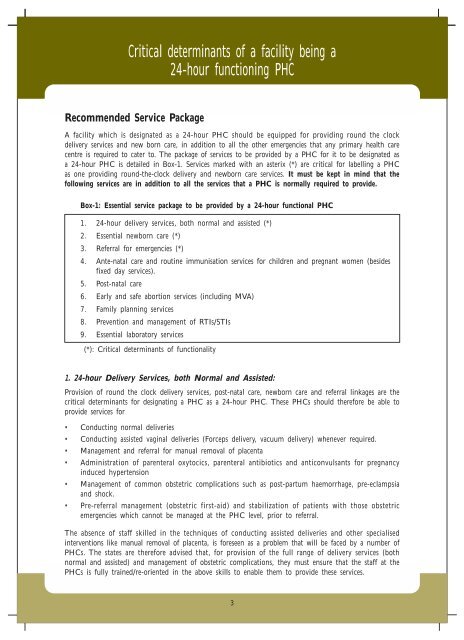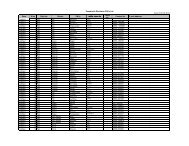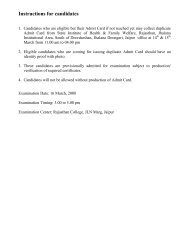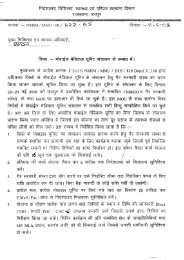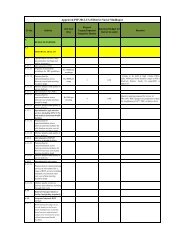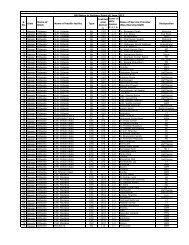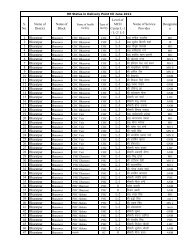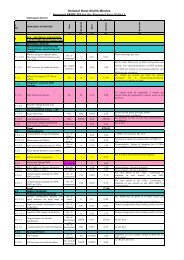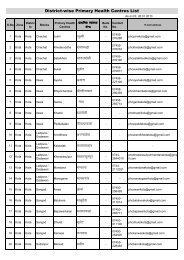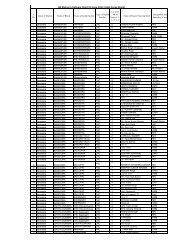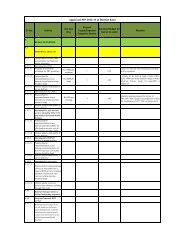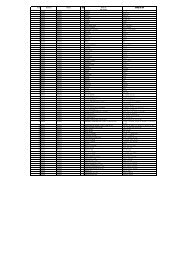Critical determinants of a facility being a24-hour functioning PHCRecommended Service PackageA facility which is designated as a 24-hour PHC should be equipped <strong>for</strong> providing round the clockdelivery services and new born care, in addition to all the other emergencies that any primary health carecentre is required to cater to. The package of services to be provided by a PHC <strong>for</strong> it to be designated asa 24-hour PHC is detailed in Box-1. Services marked with an asterix (*) are critical <strong>for</strong> labelling a PHCas one providing round-the-clock delivery and newborn care services. It must be kept in mind that thefollowing services are in addition to all the services that a PHC is normally required to provide.Box-1: Essential service package to be provided by a 24-hour functional PHC1. 24-hour delivery services, both normal and assisted (*)2. Essential newborn care (*)3. Referral <strong>for</strong> emergencies (*)4. Ante-natal care and routine immunisation services <strong>for</strong> children and pregnant women (besidesfixed day services).5. Post-natal care6. Early and safe abortion services (including MVA)7. Family planning services8. Prevention and management of RTIs/STIs9. Essential laboratory services(*): Critical determinants of functionality1. 24-hour Delivery Services, both Normal and Assisted:Provision of round the clock delivery services, post-natal care, newborn care and referral linkages are thecritical determinants <strong>for</strong> designating a PHC as a 24-hour PHC. These PHCs should there<strong>for</strong>e be able toprovide services <strong>for</strong>• Conducting normal deliveries• Conducting assisted vaginal deliveries (Forceps delivery, vacuum delivery) whenever required.• Management and referral <strong>for</strong> manual removal of placenta• Administration of parenteral oxytocics, parenteral antibiotics and anticonvulsants <strong>for</strong> pregnancyinduced hypertension• Management of common obstetric complications such as post-partum haemorrhage, pre-eclampsiaand shock.• Pre-referral management (obstetric first-aid) and stabilization of patients with those obstetricemergencies which cannot be managed at the PHC level, prior to referral.The absence of staff skilled in the techniques of conducting assisted deliveries and other specialisedinterventions like manual removal of placenta, is <strong>for</strong>eseen as a problem that will be faced by a number ofPHCs. The states are there<strong>for</strong>e advised that, <strong>for</strong> provision of the full range of delivery services (bothnormal and assisted) and management of obstetric complications, they must ensure that the staff at thePHCs is fully trained/re-oriented in the above skills to enable them to provide these services.3
2. Essential Newborn CareTwo thirds of all infant deaths take place during the neonatal period. The most common causes ofneonatal mortality are pre-maturity, neonatal tetanus, septicaemia and birth injury.Provision of essential newborn care to every baby can help prevent the development of variouscomplications which are the causes of neonatal mortality. Every facility providing round the clock serviceswill need to have provision <strong>for</strong> essential newborn care <strong>for</strong> every baby born there. Equipment and kitsrequired <strong>for</strong> the same are being supplied to the public sector health care facilities under RCH-II. It isalso envisaged that training will be imparted to all the health care functionaries posted at these 24-hourfacilities, who will be responsible <strong>for</strong> providing newborn care. These PHCs should, there<strong>for</strong>e, be able toprovide services <strong>for</strong> the following and on which training should be imparted:• Basic resuscitation technique,• Identification, management and referral of the sick newborns,• Feeding of the neonate, assessment of breastfeeding and solving breastfeeding problems• Special care <strong>for</strong> the Low Birth Weight (LBW) babies.• Management of sick childrenThese facilities should also be equipped <strong>for</strong> providing care to the sick neonate. It must be rememberedthat a sick neonate deteriorates very fast, and there<strong>for</strong>e needs immediate attention. A 24-hour PHCshould be equipped to handle the common emergencies that a sick neonate may present with.The most common causes of infant mortality are diarrhoea, ARI, malaria, measles and malnutrition. Thepolicy of Integrated Management of Neonatal and Childhood Illnesses (IMNCI) is a holistic outlook <strong>for</strong>the outpatient management of common childhood illnesses. Implementation of the same along with inpatientmanagement guidelines <strong>for</strong> management of severe malnutrition and selected conditions such assevere dehydration, severe pneumonia and malaria at the 24-hour PHC can help save numerous livesduring infancy.3. Referral <strong>for</strong> EmergenciesReferral should not be misunderstood as only provision of transport facilities to send a woman with obstetriccomplications to a referral facility. It is an active process which begins at the doorstep of the patient'shousehold, transits through the referral facility and, in theory, ends again at the patient's household.Planning is required at the local level <strong>for</strong> managing referral linkage. Referral should be made toappropriate pre-determined referral centres. The Medical Officer, and all health personnel should beaware of the services and facilities available at various referral centres, both in Public and Private sectorsand should be aware where to refer <strong>for</strong> a particular emergency.The community should be made aware of conditions in which a woman and a child require immediatereferral (the danger signs), the transport facilities available, and the place where they should go in case ofvarious emergencies. Referral should be made keeping in mind the geographical accessibility and theperceived quality of care of the referral centre, and the financial status of the patient and her family.The PHC staff should involve and encourage ASHA and other community based volunteers/workersto work with the community to make them aware of the danger signs in women, newborns andchildren who require referral to an appropriate health facility. Community should be made aware ofthe names and location of various health facilities where such cases can be referred.4


